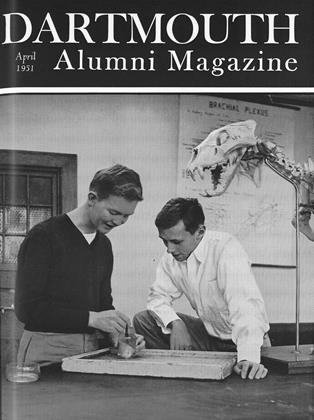by Prof. FrancoisDenoeu. Librairie Jean Mordacq, Aire-sur-la-Lys (Pas-de-Calais), 1950. For sale at Dartmouth Bookstore. 81 pp., 60 cents.
In these two delightful one-act plays Professor Denoeu makes his first excursion into the realm of the theatre. The first play, Moliere at Ses Amis, was presented a dozen or so years ago in Robinson Hall by the members of the Cercle Francais of Dartmouth College. It is an attempt (and a successful one) to recapture the spirit and the esprit of the age of Louis XIV. The cast of characters, being drawn from real persons of the seventeenth century part (Madame de la Sabliere, Ninon de Lenclos, Moliere, Boileau), succeeds in making this, to most people, perhaps, rather dim and unreal century vivid and actuel. It arouses a not unpleasant nostalgia for the gold and crimson of Versailles and Fontainebleau.
The second play, which might be called in English Fun in Study-Hall, is, as might be guessed, in a much more playful mood than the first. It presents the secular problem of the conflict between youth and age, between the teacher and the taught. A group of lyceens, confined to study-hall for lack of academic fervor, take vengeance on their stern and somewhat sadistic principal by having one of their number impersonate the distinguished and awe-inspiring superintendent of schools. The pseudo-superintendent berates and reviles the principal as he has berated and reviled his erring pupils; in short, in a manner dear to the heart of every bureaucrat of whatever place or time.
These two plays are admirably adapted for presentation by American students of French. Moliere at Ses Amis is perhaps more appropriate for college students, as it is subtler, wittier, and requires more mature interpretation to make it effective. The more boisterous humor of Les Gaietes de la Consigne would make it suitable for secondary schools as well as for colleges. The success of Marcel Pagnol's Topaze, with its scenes from school life, would indicate that it might have an even wider appeal. The present reviewer hopes that both these plays will gain wide recognition among American schools and colleges.
 View Full Issue
View Full Issue
More From This Issue
-
 Article
ArticleIt All Began in Hanover
April 1951 By FORD H. WHELDEN '25 -
 Article
Article1951 Fund Agents
April 1951 -
 Class Notes
Class Notes1918
April 1951 By ERNEST H. EARLEY, DONALD L. EARR, RICHARD A. HOLTON -
 Class Notes
Class Notes1949
April 1951 By ROBERT H. ZEISER, DAVID S. VOGELS JR., JOHN F. STOCKWELL -
 Class Notes
Class Notes1923
April 1951 By TRUMAN T. METZEL, COLIN C. STEWART 3RD, LEON H. YOUNG JR. -
 Class Notes
Class Notes1911
April 1951 By NATHANIEL G. BURLEIGH, SARGENT F. EATON, MALCOLM G. ROLLINS
Books
-
 Books
BooksCOLLECTED POEMS 1930-1960.
February 1961 By ALEXANDER LAING '25 -
 Books
BooksCALCULUS OF FUNCTIONS OF ONE ARGUMENT.
July 1960 By BANCROFT H. BROWN -
 Books
BooksHUCK JONES: A Novel of a Pre-Teenage Boy.
March 1958 By C.N. ALLEN '24 -
 Books
BooksLINDSAY’S PROMISE. THE DREAM THAT FAILED. A PERSONAL ACCOUNT.
OCTOBER 1970 By H. Wentworth Eldredge ’31 -
 Books
BooksThe Evolution of the Vertebrates and Their Kin.
May 1912 By R.F. -
 Books
BooksJOHN LEDYARD'S JOURNAL OF CAPTAIN COOK'S LAST VOYAGE.
JUNE 1964 By W. RANDALL WATERMAN


